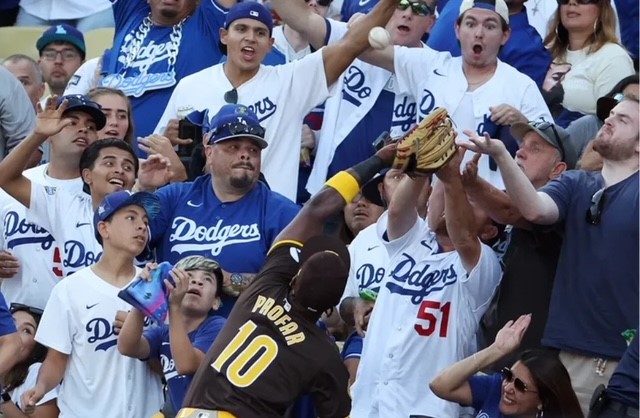
Fans Need To Do Their Job
In the bottom of the first inning of Game 2 of the NLDS, Mookie Betts hit a ball 354 feet down the left field line. Jurickson Profar, a converted shortstop, went back to the wall, leaped into the stands extending his gloved left hand as far as he possibly could, and then retreated back onto the field of play, bouncing on both feet like a kid on Christmas morning. Betts was somewhere between second and third base when Profar finally divulged that he had caught the ball. His antics fooled Betts, the fans, and the television broadcast, which had displayed a home run graphic while Mookie circled the bases.
In the aftermath of Profar’s play, the Dodger fans were none-too-pleased, which led to jawing, and then ball-throwing, and then a nine-minute delay before the seventh inning while security encircled the outfield, led fans to jail, and cleaned up the beers dropped onto the warning track.
For starters, fan should NEVER act that way. Buying a ticket does not give you a license to say rude or offensive things to players (I understand some people may have a different view of this). Buying a ticket does not legally allow you to throw things – balls or beers – onto the field. In short, just because you buy a ticket doesn’t mean you automatically get to be a jerk.
But, buying a ticket, does give the fan a certain type of license.
MLB Rule 6.01(e), discusses “Spectator Interference” as follows: “When there is spectator interference with any thrown or batted ball, the ball shall be dead at the moment of interference and the umpire shall impose such penalties as in his opinion will nullify the act of interference.”
The penultimate two sentences of the official comment to the rule states: “No interference shall be allowed when a fielder reaches over a fence, railing, rope or into a stand to catch a ball. He does so at his own risk.”
As such, fans do have the right to catch a ball that comes into the stands. Fans are given license to mess with the player diving over the wall. Fans have as much right to the ball as the player, and if that means hitting an arm or knocking a glove off a hand, so be it.
Accordingly, while I blame the Dodger fans for their putrid behavior before the seventh inning, I also blame the fans for allowing Profar to make that catch. There is simply no world in which a visiting player, during a playoff game, in a packed stadium, should ever be able to make that play. In 1989, Bill Welch and Jeff Moses published “The Tenth Man: How Major League Baseball Teams Can Gain a 2 to 3 Run Advantage Every Game.” The Seattle Seahawks have made an industry out of the 12th man, as their fans have an adverse effect on visiting players. There is a real benefit to playing at home, but only if the fans do their job.
When you watch the video of Profar’s catch, you can clearly see multiple fans who had a clear shot to either catch the ball or interfere with Profar’s ability to do so. They all failed at their job. The poor security guard can be seen cowering, and he may have impeded some fans getting in Profar’s way, but there were plenty of others available.
Fernando Tatís had hit a home run in the top of the first inning of this pivotal game, and Betts was about to even the score. And, maybe more importantly, Betts was about to end his 0-for-18 post-season hitting woes. As it turned out, it took another full game – pushing the streak to 0-for-22 – before Betts got a hit, which was an actual homer over the outstretched arm of Profar (again). Who’s to say what the rest of Game 2, an eventual 10-2 Padres blowout, would have looked like had the score been 1-1 after 1, with Mookie feeling confident at the plate.
The Dodger fans cannot be blamed for the six home runs that Dodger pitchers surrendered in that game. But they can be blamed for the one home run that they allowed a Padres pitcher to not surrender. Fans can hoot and holler; they can sing and dance and call out their team’s name during “Take Me Out To The Ballgame.” Fans can wave rally towels and stand when their pitcher gets two strikes on an opposing batter. And they can – and should – do anything and everything possible to make sure that the opposing team does not reach into the bleachers and pull back an actual, verifiable, genuine home run ball. If they fail to do that when given that opportunity, then they have failed their team, they have failed to do their job. There is no question that the Dodger fans failed their team in the first inning of Game 2 of the NLDS.
PLAY BALL!!